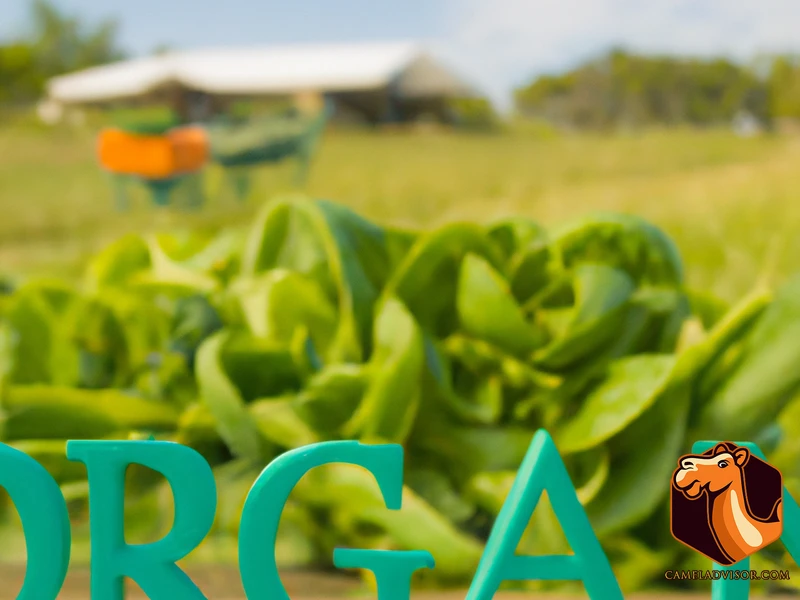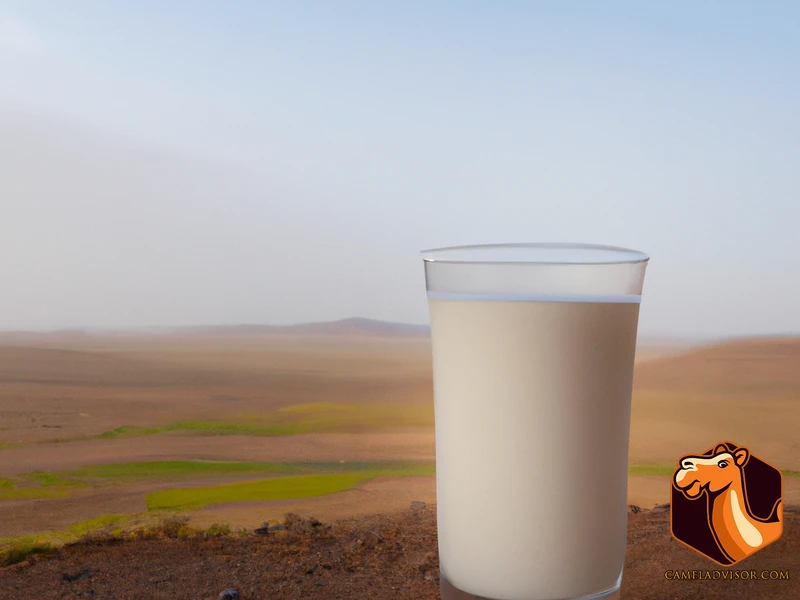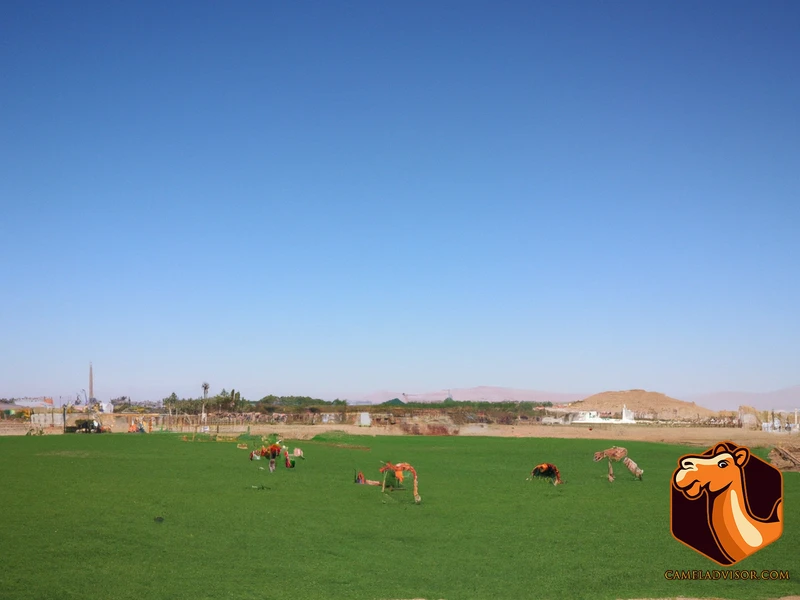As consumers become more concerned about the source of their food and its effects on health and the environment, organic farming and its benefits have become an increasingly popular topic. Organic farming is a practice that has been around for centuries but has gained momentum in recent years due to its positive impact on both animal and human health. This article will explore the benefits of organic farming for camel milk production, examining why camel milk is special, the advantages of organic farming practices for camels, and the nutritional and health benefits of organic camel milk for human consumption. Additionally, we will delve into the environmental benefits of organic farming, its potential impact on climate change and the future of organic camel milk production.
Contents
- What is Organic Farming?
- Camel Milk Production
- Organic Camel Milk and Human Health
- Environmental Benefits of Organic Farming
- The Future of Organic Camel Milk Production
- Conclusion
-
Frequently Asked Questions
- What is the difference between organic and conventional farming?
- Is camel milk safe to drink?
- What makes camel milk unique?
- How does organic farming benefit the environment?
- Are there any health benefits to consuming organic camel milk?
- Can organic farming practices improve the quality of camel milk?
- Is organic camel milk more expensive than conventional camel milk?
- What are some of the potential risks associated with conventional camel milk production?
- Can organic farming practices help to mitigate climate change?
- What is the outlook for the future of organic camel milk production?
- References
What is Organic Farming?

Organic farming is a method of growing crops or raising animals without using synthetic chemicals such as fertilizers, pesticides or hormones. Instead, organic farmers use natural methods to enhance soil fertility, control pests and diseases, and improve animal welfare. Organic farming practices may vary depending on the location and the type of crop or livestock being raised, but they all share a common goal – to produce food that is healthy, nutritious, and free from harmful substances. In the next section, we will explore the benefits of organic farming practices in more detail. If you are interested in learning more about camel milk processing and preservation, check out our article on challenges and solutions.
Benefits of Organic Farming Practices
Organic farming has numerous benefits over conventional farming practices. The benefits of organic farming practices are as follows:
| Benefits of Organic Farming Practices |
|---|
| Decreased exposure to harmful chemicals |
| Better quality milk due to healthier animal diets |
| Reduced soil erosion |
| Improved soil quality due to natural fertilizers |
| Environmentally sustainable farming practices |
| Improved biodiversity and ecosystem health |
| Positive impact on climate change |
| Promotes animal welfare |
By not using synthetic pesticides, herbicides, and fertilizers, organic farming reduces the risks associated with exposure to such harmful chemicals. This, in turn, leads to healthier soil, better crop yields, and a safer environment for farmers, farmworkers, and consumers.
Organic farming practices also lead to healthier animals and better quality milk. By providing a natural and balanced diet, such as grass, hay, and other pasture plants, animals have better nutrition and more options to graze. This, in turn, leads to better quality milk production.
Additionally, organic farming practices have a positive impact on the environment. They reduce soil erosion and improve soil quality as natural fertilizers are used. Organic farming is also a more sustainable farming practice that promotes biodiversity and ecosystem health.
Lastly, organic farming has a positive impact on the welfare of the animals. Animals that are raised in organic farming practices have access to fresh air, clean water, and sunlight. They are also not given any hormones or antibiotics, which can be harmful to their health.
The benefits of organic farming practices cannot be ignored. By reducing exposure to harmful chemicals, promoting animal welfare, and having a positive impact on the environment, it is clear that organic farming should be a priority in the farming industry.
Camel Milk Production
One might wonder about the complexities of producing milk from such a unique animal as the camel. From their adaptation to harsh desert environments to their docile nature, camels continue to provide many benefits to humans. Along with being a mode of transportation and source of meat, their milk has also been consumed for centuries. In this section, we will explore the process of camel milk production and how organic farming can positively impact it. For those interested in improving camel milk production yields, there are some effective ways to do so, and for those curious about the future of the industry, they can read about the prospects for camel milk production. Additionally, this section will touch on the genetics behind camel milk breeding and the traditional methods of production.
Why Camel Milk is Special
Camel milk is a unique and special product that has been consumed for centuries in various parts of the world. Here are some reasons why camel milk is special:
| Nutritional Content | Camel milk is high in nutrients such as protein, vitamin C, iron, and calcium. It also contains less fat than cow’s milk, making it a healthier option. |
|---|---|
| Therapeutic Properties | Camel milk has been shown to have various therapeutic properties. It has natural antimicrobial, antiviral, and anti-inflammatory properties that can help maintain a healthy immune system. |
| Adaptability | Camels are able to produce milk in harsh environments where other types of livestock cannot survive. They are able to go for long periods without water and can withstand extreme temperatures, making them a valuable asset for many communities. |
Due to these unique qualities, the demand for camel milk has been steadily increasing over the years. However, in order to produce high-quality camel milk, it is important to use sustainable and organic farming practices. To achieve this, camel milk farmers need to pay close attention to factors such as genetics and breeding, as well as the environment in which their camels are raised. For more information about genetics and breeding in camel milk production, see our article on Genetics and Camel Milk Breeding.
The Benefits of Organic Farming for Camels
Organic farming is proven to have numerous benefits for camels, ranging from their health and well-being to the quality of the milk they produce. Here are some of the ways organic farming benefits camels:
- Improved Health: Camels that are raised on organic farms are exposed to fewer pesticides, antibiotics, and growth hormones, which can impact their health in a variety of negative ways. Organic farming practices prioritize the use of natural remedies and prevention techniques to keep animals healthy, instead of relying on harsh chemicals.
- Natural Feeding: Organic farming requires that camels are fed a diet which resembles their natural diet, rather than a diet that is artificially manipulated to increase milk production. This means that camels are given access to open pastures and are able to graze on a variety of grasses, shrubs, and trees.
- No Stress: Organic farming prioritizes low-stress environments for animals, which can positively impact the amount and quality of milk they produce. Camels that are raised in cramped or stressful environments may produce less milk and may be more prone to illness and disease.
- Lower Mortality Rates: Organic farming practices can lead to lower mortality rates for camels. If camels are raised in overcrowded or unsanitary conditions, they may be more prone to disease and illness, which can lead to higher death rates. Organic farming practices prioritize the health and well-being of the camels, which can lead to longer, healthier lives.
Organic farming practices prioritize the health and well-being of camels, which can lead to a healthier, more productive herd. By prioritizing natural feeding, low-stress environments, and prevention techniques, organic farmers can produce high-quality camel milk without relying on harsh chemicals and drugs.
Organic Camel Milk and Human Health

When it comes to nourishing the human body, we are constantly on the lookout for the best sources of nutrients. Camel milk has been gaining popularity in recent years as a healthy and nutritious beverage. However, the benefits of organic camel milk take this to a whole new level! Not only is it packed with essential nutrients, but organic farming practices ensure that it is free from harmful chemicals and additives. Let’s explore the many benefits of organic camel milk for human health.
Nutritional Benefits of Organic Camel Milk
Organic camel milk, like all milk, is an excellent source of nutrition. It is rich in essential vitamins and minerals that are important for maintaining good health. Here are some of the key nutritional benefits of organic camel milk:
- High in Protein: Organic camel milk contains about 3-5% protein, which is similar to cow’s milk. However, camel milk has a different protein structure than cow’s milk, making it easier to digest and less likely to cause allergies.
- Rich in Vitamins and Minerals: Organic camel milk is a good source of vitamins A, B1, B2, B12, and D, as well as minerals such as calcium, potassium, magnesium, and iron. These nutrients are important for maintaining healthy bones, teeth, and muscles, and supporting the immune system.
- Low in Fat: Organic camel milk is lower in fat than cow’s milk, with only about 2-3% fat. This makes it a good option for those who are watching their fat intake.
- Free from Hormones and Antibiotics: Organic farming practices ensure that camels are not given hormones or antibiotics, which can affect the nutritional content of the milk.
These nutritional benefits make organic camel milk a healthy and nutritious option for individuals of all ages. Additionally, the unique composition of camel milk may provide additional health benefits, such as improving immune function and reducing inflammation.
Health Benefits of Organic Camel Milk
Organic camel milk is not only a delicious drink, but also offers numerous health benefits. Some of the key health benefits associated with organic camel milk are:
- Rich in nutrients: Organic Camel milk is packed with essential vitamins and minerals, including vitamin C, iron, calcium, and magnesium. It also contains high amounts of protein and lower amounts of fat than cow’s milk.
- Aids digestion: The presence of unique proteins, such as immunoglobulins and lactoferrin in organic camel milk, helps in improving digestion and preventing gastrointestinal infections.
- Boosts immune system: Organic camel milk is rich in immune-boosting components, such as lactoferrin, immunoglobulins, and lysozyme, which can help fight off diseases and infections.
- Good source of probiotics: Organic camel milk contains probiotics like Lactobacillus, which is essential for maintaining a healthy gut microbiome.
- Helps manage diabetes: Organic camel milk has a low glycemic index, making it an ideal drink for people with diabetes. It has been found to regulate blood sugar levels and improve insulin sensitivity.
- May help in treating autism: Some studies have found that organic camel milk can help in improving symptoms of autism, such as lethargy, social withdrawal, and cognitive impairment.
- May help in managing cardiovascular diseases: Organic camel milk is low in saturated fat, and its consumption has been linked to improvement in lipid profile, preventing cardiovascular diseases.
The consumption of organic camel milk can be a great addition to anyone’s diet, with its numerous health benefits, making it a popular choice among health-conscious consumers.
Benefits of Organic Farming for Consumers
Organic farming not only benefits the environment and the health of animals, but it also has numerous advantages for consumers. These benefits include:
| Benefits | Explanation |
|---|---|
| Higher Nutritional Value | Organically farmed crops and animals tend to have higher levels of vitamins, minerals, and antioxidants, leading to better nutritional value for consumers. Organic camel milk, for example, has higher levels of iron, vitamin C, and protein than conventionally produced milk. |
| Better Taste | Many people find that organically farmed foods taste better than their conventionally produced counterparts. This could be due to the lack of pesticides and chemical fertilizers, as well as the overall health of the plants and animals. |
| No Harmful Chemicals | Organic farming practices prohibit the use of synthetic pesticides and fertilizers, which can be harmful to human health. By consuming organic foods, people can reduce their exposure to potentially dangerous chemicals. |
| Not Genetically Modified | Organic farming also prohibits the use of genetically modified organisms (GMOs). Some consumers are concerned about the potential health risks of consuming GMOs and prefer to avoid them. |
| Sustainable | Organic farming practices are designed to be sustainable and preserve natural resources for future generations. By purchasing organically produced goods, consumers can support these practices and contribute to a more sustainable food system. |
Organic farming provides numerous benefits for consumers in terms of nutrition, taste, safety, and sustainability. By choosing organic foods, consumers can feel confident that they are making healthy choices for themselves and the environment.
Environmental Benefits of Organic Farming
When it comes to food production and consumption, the impact on the environment is often overlooked. However, the consequences of unsustainable farming methods can be severe, including the loss of biodiversity, degraded ecosystems, and climate change. Organic farming practices offer a more sustainable approach to agriculture that is better for the environment. By eliminating the use of harmful pesticides and fertilizers, and adopting more natural farming techniques, organic farming has many environmental benefits that cannot be ignored. In this section, we will explore the various environmental benefits of organic farming in the context of camel milk production.
Reduction in Pesticide Use
One of the major benefits of organic farming is the decrease in pesticide usage. Pesticides are toxic chemicals used to kill off unwanted insects and weeds, and they have been shown to have serious negative effects on human health and the environment. In conventional farming, pesticides are used heavily to control pests and diseases, but organic farming methods rely on natural pest control methods that minimize pesticide usage.
Listed below are some of the ways in which organic farming helps reduce pesticide use:
- Organic farming relies on crop rotation, which is the practice of alternating the types of crops grown on a particular land over time. This technique is known to help suppress pests and diseases and lowers the need for chemical inputs.
- Organic farmers also make use of natural predators to control pests. For example, ladybirds are known to prey on aphids, which are a common pest in farms. By introducing these predators to farm environments, farmers can decrease pest populations and minimize the need for pesticides.
- Crop diversity is another effective way of reducing pesticide use. In organic farming, multiple crops are grown together on the same land, and this creates an environment that is less favorable for pests and diseases to thrive. By growing a diverse range of crops, organic farmers can limit the need for pesticides.
- Organic farmers also make use of natural substances like neem oil and garlic, which have been shown to have insecticidal properties. By using these natural substances, farmers can reduce their reliance on synthetic pesticides.
By reducing pesticide use, organic farming is able to offer safe and healthy food options that are free from harmful chemicals. Additionally, it helps protect ecosystems and biodiversity by reducing the negative impacts of conventional farming practices. Organic farming provides a sustainable solution to food production that positively impacts the health of humans and the environment.
Biodiversity and Ecosystem Health
Organic farming practices play a vital role in supporting and maintaining biodiversity and ecosystem health. The use of synthetic pesticides and fertilizers in conventional farming practices can lead to the destruction of soil health, resulting in a lack of nutrient-rich soil in which plants can grow. This, in turn, can impact the health of the entire ecosystem, including the beneficial microorganisms, insects, and animals, such as camels.
Biodiversity refers to the variety of living organisms that exist within a given ecosystem, including plants, animals, and microorganisms. By avoiding the use of synthetic pesticides and fertilizers, organic farmers can promote biodiversity on their farms. Organic farming practices encourage the preservation of natural habitats, which in turn support diverse populations of plants and animals. For example, organic farms tend to have more hedgerows, which provide habitat for beneficial insects such as bees and ladybugs.
Organic farmers often use a diverse range of crops and practice crop rotation. This promotes soil health by preventing the depletion of specific nutrients while providing food for a variety of animals, from insects to camels. Organic farming also encourages the use of natural pest control methods to deal with pests instead of artificial pesticides. This practice helps to maintain the balance of the ecosystem, as well as reducing the risk of pests developing resistance to the chemicals.
Ecosystem health refers to the overall health and balance of the natural environment. Organic farming can help to improve ecosystem health by reducing the use of hazardous pesticides and chemical fertilizers, which can damage the environment and pollute water sources. The use of organic farming methods promotes the use of natural fertilizers and crop rotation, improving soil health and water conservation.
Organic farming practices often rely on the use of composting and cover crops that promote nutrient cycling and prevent soil erosion. This helps to promote a healthy environment for camels and other animals that rely on the ecosystem for their survival. Organic farming also helps to reduce the level of greenhouse gases in the environment, which has a positive impact on the climate.
The use of organic farming practices can promote biodiversity and ecosystem health. It provides a sustainable solution to food production by maintaining soil health and water conservation. By embracing organic farming practices, farmers can enhance the quality of life of their animals, protect the environment, and strengthen food security in their communities.
Organic Farming’s Positive Impact on Climate Change
Organic farming is a sustainable agricultural system that has a positive impact on climate change. By promoting biodiversity and reducing greenhouse gas emissions, organic farming is helping to address one of the most pressing environmental issues facing the planet today.
One of the key ways that organic farming helps to combat climate change is by reducing the amount of greenhouse gas emissions that are released into the atmosphere. Organic farming practices, such as crop rotation and the use of natural fertilizers, help to build healthy soil that is better able to absorb carbon dioxide from the atmosphere. This process, known as carbon sequestration, helps to reduce the amount of carbon dioxide that is present in the atmosphere, which in turn helps to slow down the pace of global warming.
Organic farming also reduces the amount of energy that is required to produce food. Using natural fertilizers and other organic farming practices reduces the need for fossil fuels, which means that less carbon dioxide is emitted into the atmosphere during the production process. Organic farming helps to conserve water by promoting soil health, which means that less water is required for crop growth. This is particularly important in regions where water is scarce or where climate change has led to drought conditions.
Organic farming can act as a buffer against the impacts of climate change. By promoting biodiversity and healthy ecosystems, organic farms are better equipped to withstand extreme weather events such as floods, droughts, and heat waves. This resilience helps to ensure that the food supply is secure and that farmers are better able to cope with the impacts of climate change.
Lastly, organic farming promotes sustainable land use practices that protect the environment and help to preserve natural resources. By using natural methods to control pests and diseases, organic farms avoid the use of harmful chemicals that can damage the environment and disrupt natural ecosystems. This is particularly important in regions where the loss of natural habitats and the degradation of farmland are major environmental issues.
In general, organic farming is a vital component of sustainable agriculture, and its positive impact on climate change cannot be overstated. By promoting biodiversity, reducing greenhouse gas emissions, and conserving natural resources, organic farming is helping to build a more sustainable food system that is better equipped to withstand the challenges of climate change.
The Future of Organic Camel Milk Production
As the demand for organic food and sustainable farming practices grows, the future of organic camel milk production looks promising. The idea of producing camel milk sustainably is gaining traction around the world, as consumers become more aware of the health and environmental benefits associated with organic farming practices.
One of the biggest challenges facing organic camel milk production is the lack of understanding and awareness among consumers. While camel milk has been consumed as a traditional food for centuries, it is still relatively unknown compared to other popular milk sources like cow, goat, or sheep milk. As a result, many people are hesitant to try camel milk, let alone organic camel milk.
The future of organic camel milk production lies in educating consumers and building trust in the product. As more people become aware of the nutritional and health benefits of organic camel milk, demand is expected to increase. The environmental benefits of sustainable camel milk production will also play a role in driving consumer interest.
The growth of organic farming and sustainable agriculture is also expected to boost the production and availability of organic camel milk. As farmers shift towards more sustainable farming practices, including organic farming, the production of organic camel milk is likely to increase. Additionally, as organic farming becomes more mainstream, the cost of production is expected to decrease, making organic camel milk more affordable and accessible for consumers.
The future of organic camel milk production looks bright. With increasing consumer demand, growing awareness and understanding of the benefits of organic farming practices, and the shift towards more sustainable agriculture, organic camel milk is poised to become a popular and sustainable food source. As farmers and producers continue to invest in sustainable farming practices, the production of organic camel milk will only continue to grow, providing consumers with a nutritious and environmentally-friendly alternative to traditional milk sources.
Conclusion
In conclusion, organic farming offers numerous benefits to camel milk production, human health, and the environment. By using organic farming practices, farmers can ensure the health and well-being of their camels, which results in higher quality milk production. These benefits extend to consumers, who can enjoy the nutritional and health benefits of organic camel milk.
In addition, organic farming practices also have a positive impact on the environment. By reducing pesticide use, biodiversity and ecosystem health can be improved, and organic farming can contribute to reducing the effects of climate change.
As the demand for organic products continues to grow, the future of organic camel milk production looks bright. Consumers are becoming more aware of the importance of sustainability and taking steps towards a healthier lifestyle. With the numerous benefits that come with organic farming, it is likely that more farmers will adopt such practices, which would result in a greater availability of organic camel milk.
Overall, organic farming offers unique advantages that make it an ideal choice for camel milk production. From the health of camels to the environment, organic farming provides benefits that extend beyond the product itself. As such, choosing organic camel milk is a conscious choice that benefits both the consumer and the planet.
Frequently Asked Questions
What is the difference between organic and conventional farming?
Organic farming relies on natural processes and materials, whereas conventional farming often involves synthetic pesticides and fertilizers.
Is camel milk safe to drink?
Yes, camel milk is safe to drink as long as it is pasteurized and handled properly.
What makes camel milk unique?
Camel milk is unique because it has a different composition than cow’s milk, including higher levels of certain nutrients and lower levels of lactose.
How does organic farming benefit the environment?
Organic farming practices help to reduce pollution and promote biodiversity and healthy ecosystems.
Are there any health benefits to consuming organic camel milk?
Yes, organic camel milk can provide health benefits such as improved digestion, boosted immune function, and reduced inflammation.
Can organic farming practices improve the quality of camel milk?
Yes, organic farming practices can lead to healthier camels and better quality milk due to reduced exposure to synthetic pesticides and fertilizers.
Is organic camel milk more expensive than conventional camel milk?
Yes, organic camel milk is often more expensive due to the higher costs associated with organic farming practices.
What are some of the potential risks associated with conventional camel milk production?
Conventional camel milk production can involve the use of synthetic pesticides and fertilizers, as well as overuse of antibiotics, which can contribute to antibiotic resistance.
Can organic farming practices help to mitigate climate change?
Yes, organic farming practices can help to reduce greenhouse gas emissions and mitigate climate change by promoting healthy soil and reducing the use of fossil fuels.
What is the outlook for the future of organic camel milk production?
The demand for organic and sustainably produced foods is expected to continue to grow, which bodes well for the future of organic camel milk production.







